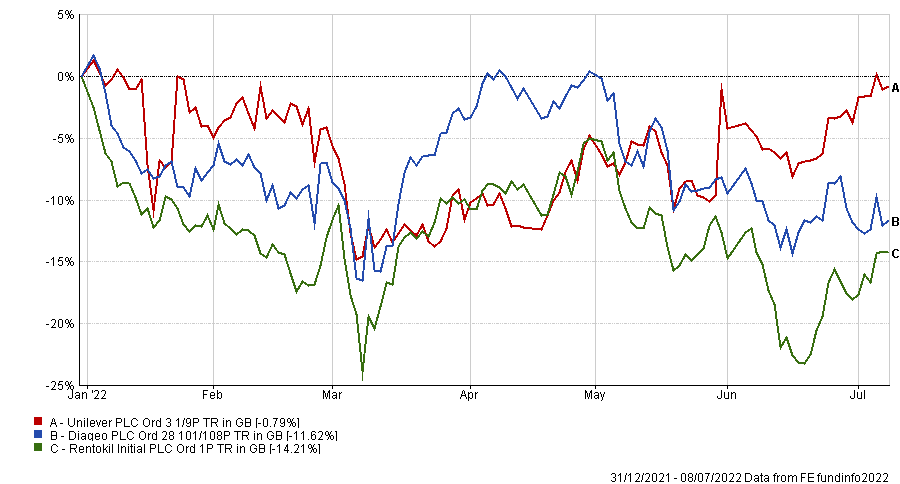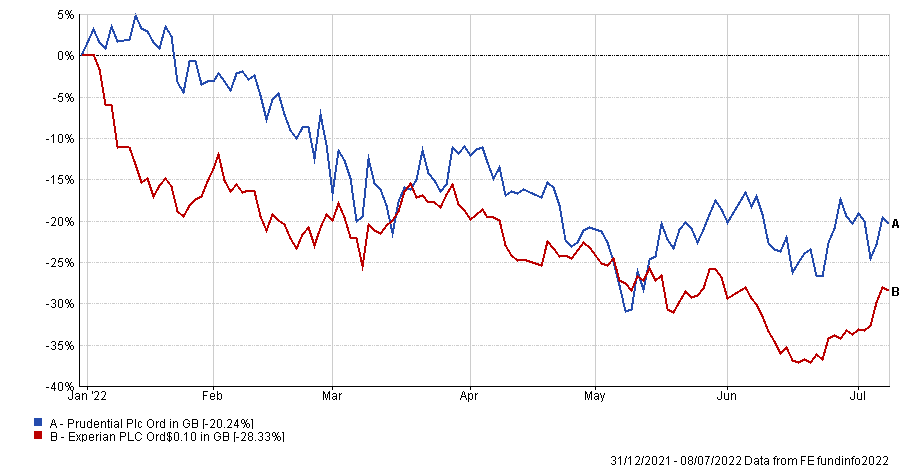UK companies paying dividends have been resurgent so far in 2022 led by the formerly maligned oil and mining sectors. These ‘value’ stocks have had a revival this year as investors have moved away from the growth names on the back of rising inflation and interest rates – which tend to have a bigger impact on companies where prices reflect future projections rather than current earnings.
A cursory glance at the Investment Association sectors illustrates this. Funds in the IA UK Equity Income sector have beaten their UK All Companies counterparts this year, losing just 5.7% versus 12.1%.
However, rampant inflation means that even with a decent dividend yield, investors are likely to be unable to keep pace with rising costs.
John Moore, senior investment manager at Brewin Dolphin, said that concerns over the effects of inflation have dragged any quality-growth companies down, but has particularly affected those that are currently unprofitable and rely on debt.
“But, in some ways the sell-off has been indiscriminate, with even companies you would expect to be more defensive, such as Unilever, down around 4%,” he said.
“High inflation does appear to be more persistent than originally anticipated, but it is expected to begin cooling later this year. If we assume that it returns to lower levels – for example, 4% – then there are a series of UK companies currently available at a reasonable discount to what they were recently worth that can help you maintain investment income in real terms.”
Consumer staples
The first bucket is consumer staples, where Moore said drinks maker Diageo, brands company Unilever and pest control firm Rentokil make reasonable options for investors trying to earn an income that can combat inflation.
Share price of stocks in 2022

Source: FE Analytics
Diageo, the firm behind brands such as Guinness and Johnnie Walker, has dropped 12.4% so far this year despite typically being viewed as a stalwart regardless of how the economy is doing.
Although shares have slumped, people like to drink whether times are good or bad, said Moore, who added that the company has “widened the products available in its brands”, which should translate into strong income growth for shareholders.
The Brewin Dolphin senior investment manager said a 6% hike to the dividend is anticipated in 2022 followed by 8% next year, building on the current yield of 2%.
Rentokil has fallen even further, down 14.9% in share price terms, but while unglamorous, pest control has proven to be steady industry over the years.
“Having agreed the takeover of US rival Terminix, management appears to be optimistic about the future too, with a 5% increase to the company’s dividend expected this year and another 10% next year,” said Moore.
Finally, while Unilever is down less than 3% in 2022 so far, the firm behind household products ranging from Marmite to Dove soap has often been seen by investors as a ballast during difficult times.
“Although the dividend increase for 2022 is relatively modest at 1.5%, the stock already yields 4.1% and could benefit from a 4% increase in 2023,” said Moore.
Financials
While banks may be the obvious beneficiary of rising interest rates – the Bank rate directly influences their profit margins on loans – one area investors might want to consider is insurance.
Prudential is one of the largest insurance firms listed in the UK but after selling off its UK and US operations it is entirely concentrated on Asia.
Although shares have slumped 20.2% so far this year, Moore said its 1.3% yield should increase in the next couple of years: “It should grow by double-digits in both of the next two years, with expected rises of 13% and 8%, as the refocused and leaner business becomes more cash generative.”
Share price of stocks in 2022

Source: FE Analytics
Meanwhile, credit score firm Experian remains an “important cog” in the financial system, used by people and businesses across the world to complete loans.
“Its shares have suffered since the turn of the year, causing the dividend yield rise to more than 1.5%. On top of that, analysts have pencilled in potential dividend growth of 12% this year and the same again next year,” said Moore.
Renewable energy
Last up, the senior investment manager highlighted a stock that has actually risen so far this year: Greencoat UK Wind. The investment trust is up 10.1% so far this year, beating the average IT Renewable Energy Infrastructure fund by 4.7 percentage points.
Environmental, social and governance (ESG) funds have had a poor year overall as they tend to invest in growth names, but pockets in the sector have performed well.
Renewable energy infrastructure has bucked the trend as investors have been enticed by the predictable earnings, as well as the fact that some are inflation-linked.
“Despite the stock market volatility since the turn of the year, the trust has performed well in the and sits at a premium to its net asset value, which has narrowed from a peak of more than 15% during February,” said Moore.
“At least part of the reason for its recent success is that it provides investors with a way of offsetting rising energy prices and delivering RPI-linked increases to its dividend, with a current yield of nearly 5%.”





